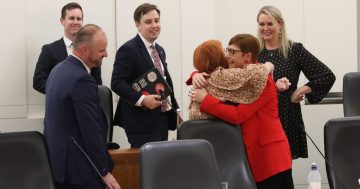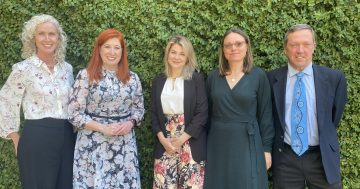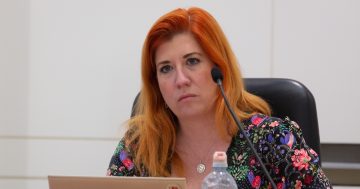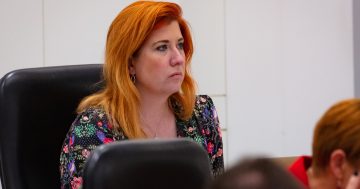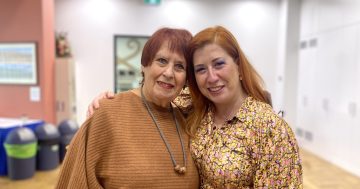
Team effort: ACT politicians and supporters at Parliament House last night for the Territory Rights Bill vote. Photo: Supplied.
Draft legislation for voluntary assisted dying will likely be introduced into the Legislative Assembly in August next year after what Chief Minister Andrew Barr called a “thorough” process to consult with the ACT community.
Welcoming the passing of the Restoring Territory Rights Bill last night, Mr Barr said that process would be led by himself, Human Rights Minister Tara Cheyne, Health Minister Rachel Stephen-Smith and Attorney-General Shane Rattenbury.
“We understand the significant obligation that is now on the ACT and NT Legislative Assemblies,” he said.
It will be a government bill but Labor members would be given a conscience vote, as would Liberal MLAs, while voluntary assisted dying is a Greens policy and all their members support it.
“We know there will be a respectful and detailed engagement for the Territory parliament on this matter,” Mr Barr said.
The Government will use the Christmas and New Year period to refine and finalise the public consultation process, which will include a discussion paper to be released in late January or early February.
It will include questions on a range of issues including safeguards, eligibility and residency requirements.
That consultation will run for a minimum of eight weeks.
The Government will prepare and release a listening report on the feedback, with plans to introduce a Voluntary Assisted Dying Bill to the ACT Legislative Assembly in the second half of 2023, probably during the August sitting.
The draft legislation will then be scrutinised by an Assembly committee for a minimum three-month period, meaning the bill could be debated towards the end of 2023.
ACT Attorney-General Shane Rattenbury said that while he believed the community was relieved at the Senate vote, and wanted the Assembly to deal with the issue, it did not want the process rushed.
“That’s why we’re setting out a clear timetable,” he said.
“We want to move forward on this legislation, but we’ll do it in a way where they there is a strong chance for community input. We will be seeking that feedback. We’ll be putting it out there in a very transparent way.”

Attorney-General Shane Rattenbury says a clear timetable and strong community input is needed. Photo: Ian Bushnell.
The government does not have a preferred model and will take the best parts from the six voluntary assisted dying schemes set up by the states.
Asked about checks and balances in any legislation, Mr Rattenbury said the government would need to listen to the community and its concerns.
“We now have the opportunity to have this discussion with our community to ask them these questions, ask them what thresholds they want to see prominent in the legislation,” he said.
“And that means talking to a range of people in our community.
“The medical profession will have views. I imagine there will be different views in the disability community, within our culturally and linguistically diverse community there will be different views on this and so the job of the Assembly over the coming 12 months or so will be to try and listen to those communities very carefully, and then to synthesise them into a model of legislation.
Mr Rattenbury said the role of Catholic-run Calvary Public Hospital in any ACT voluntary assisted dying scheme would be a sensitive question.
“I don’t know Calvary’s position at the moment, that’s something we will need to talk to them about,” he said.
Ms Cheyne led the ACT Government’s drive to overturn the Andrews Bill denying the territories the right to debate and legislate on the issue and was at Parliament House last night with Mr Barr, federal colleagues, Senator David Pocock and other supporters when the vote carried on voices.
“It has been decades in the making to right this wrong, to correct this injustice,” she said.
“We are indebted to the hundreds of thousand of people who for so long have not given up, and tonight’s result is reflection of their perseverance and commitment to territory rights, to democratic rights which ultimately are human rights.”
Former chief minister Senator Katy Gallagher said it was a really significant and historic moment that many had fought a long time to witness.
“I know how much the restoration of territory rights matters to Canberrans,” she said.
“It’s something I championed as Chief Minister, I fought for as a Senator and am now really proud to have played a part in delivering as part of a Federal Labor Government.”
Senator Pocock said the ACT community could now start having the conversation on whether a voluntary assisted dying scheme is right for us.
“Dignity, freedom and choice shouldn’t end at the borders we draw on a map. We are all Australians and we all deserve the same democratic rights,” he said.
“I look forward to the ACT Legislative Assembly leading that discussion, drawing on diverse voices and asking the right questions on whether it is appropriate for our community and what safeguards should be considered.”












